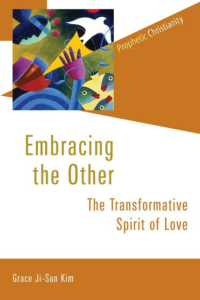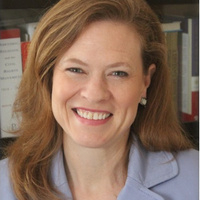Grounding Politeness, Duty, and Honor in Solidarity and Love By Elizabeth Hinson-Hasty
“To dismantle the injustice of white privilege, we must first recognize it … those institutions that maintain white privilege need to be identified and viewed with suspicion.” —Grace Ji-Sun Kim, Embracing the Other, 49.
My son was first invited to spend the night at a friend’s house when he was seven years old. I vividly recall the afternoon his friend’s mother stopped me in the hallway of their elementary school to extend the invitation. She was bubbly, warm, and strikingly honest: “Elizabeth, our son has such a great time with Garrison. He wants to invite him over to spend the night. I will be honest with you that we don’t allow any guns in our household.” Not exactly the reveal I expected to follow the invitation. How many parents do you know who are willing to be that honest and upfront about their beliefs on what many people perceive to be a controversial topic like guns? I remember at the time being surprised by her honesty, but, a refreshing feeling of relief also washed over my body. She named something I really wanted to know, but that I couldn’t figure out how to ask because it seemed impolite. My friend cut right through a well-established boundary of social pleasantry. Thank God, and I mean that quite sincerely.
My skin is white. In US culture, whiteness affords me the privilege of not having to think too much about my body’s pale exterior. Most of the people with whom I work and count as close friends are conscious of the concepts of whiteness and white privilege and view them with suspicion. However, many times I also have been taken by surprise by other white people who falsely assume that because of my skin that I will agree with them that whites need to preserve privilege and power for themselves.
Sometimes the assumption that I am “safe” is made by opening up a conversation with a statement like “I’m not racist, but …”. Sometimes it happens through unspoken body language like subtle eye rolls while standing in the checkout line when the grocery store clerk is moving slowly. Or, it could be in the form of other white parents sharing insider information about public schools in the “best” areas of town. Often there is no mention of race in those conversations; race is simply “understood.”
Other times racism is much more overt. You may remember the news story from Christmas 2016 about a white woman who verbally berated two Latina women because they wanted to add an item to their purchase while standing in the checkout line of a store at a mall in the Louisville area. The woman said, “Tell ‘em to go back to where they belong.” If you don’t remember you can watch the scene here.
These stories are vulgar and enraging. It may be tempting for many whites to want to avoid talking about them because talking about race is uncomfortable for whites. No one enjoys looking at the “log in their own eye.” We also may not feel like we fit in with the racist group or maybe we are already working to transform systems of oppression and white supremacy. However, I think it is critical, particularly for whites, to confront racism. In fact, it is our duty because we still benefit from white supremacy even when we would rather not. Our skin makes us guilty by association.
In her illuminating book Embracing the Other, Grace Ji-Sun Kim underscores how race “functions as a category of human classification, identity, and differentiation for the benefit of some and the detriment of others” (Kim, 43). In the examples that I have just mentioned the social construction of race “erases white people from being conceptualized as racial” (Kim, 43). What the dominant group considers socially acceptable is coded white.
Another important dynamic in my context should be addressed. I have lived most of my adult life in the Southeastern US: a culture where “if you don’t have anything good to say, you don’t say anything at all.” One of the worst offenses, particularly for white middle and upper class women, is to disrupt dominant norms of social pleasantry. Remember another antiquated teaching related to white womanhood: it is “better to be seen than heard.” What becomes second nature is to remain silent for the sake of preserving social pleasantry. However, silence in this context functions as an expression of or as a means to reinforce white supremacy by failing to hold other whites accountable for their actions.
Therefore, those of us with white skin must break our silence. Drawing upon Homi Bhabha’s work, Kim writes about entering a “Third Space” that is an “in between space, which questions established categorizations of culture and identity and opens up the possibilities of renegotiating power and creating new cultural norms” (Kim, 57). The “Third Space” is a place where we interrogate and redefine white norms and concepts such as politeness, honor, duty, valor, and shame.
An observation frequently made about the woman berating the Latina women in the checkout line last Christmas was that it took so long for anyone to confront her. What prevented the observers from speaking up immediately? Was it shock, shame, fear of being impolite, or fear of losing some of their own privilege? Whatever the reason, the white woman initially interpreted the silence as the crowd’s agreement with her actions. What if we entered a third space and grounded our common understanding of politeness and duty in the values and norms of solidarity and love, rather than avoiding confrontation by not saying anything at all?
I began my reflection with the story about my friend’s honesty and willingness to break dominant norms of social pleasantry and politeness. I have never directly asked her what motivated her to be so honest about not having guns in her home. But, I know it was more than safety. I believe her honesty emerged from her refusal to be numb to the pain and fears of others. As a devout Jew, she values hospitality for the stranger and God’s love of justice as the foundations of a community of shared partnership. How would our communities change if we surprised others by entering the “Third Space” and being willing to redefine politeness, honor, duty and shame? Standing in solidarity with those pushed to the periphery in our society would then become not only the duty of whites, but also our most honorable act. Maybe white willingness to break established white boundaries of social pleasantry and politeness will be surprising to others in our community with whom we should stand in solidarity.
The Rev. Dr. Elizabeth Hinson-Hasty is professor of theology and chair of the department of theology at Bellarmine University in Louisville, Kentucky. Her most recent book on The Problem of Wealth: A Christian Response to a Culture of Affluence will be published in August 2017 by Orbis Books. She is also the author of Reconciling Paul, the 2014-2015 Horizons Bible Study.

